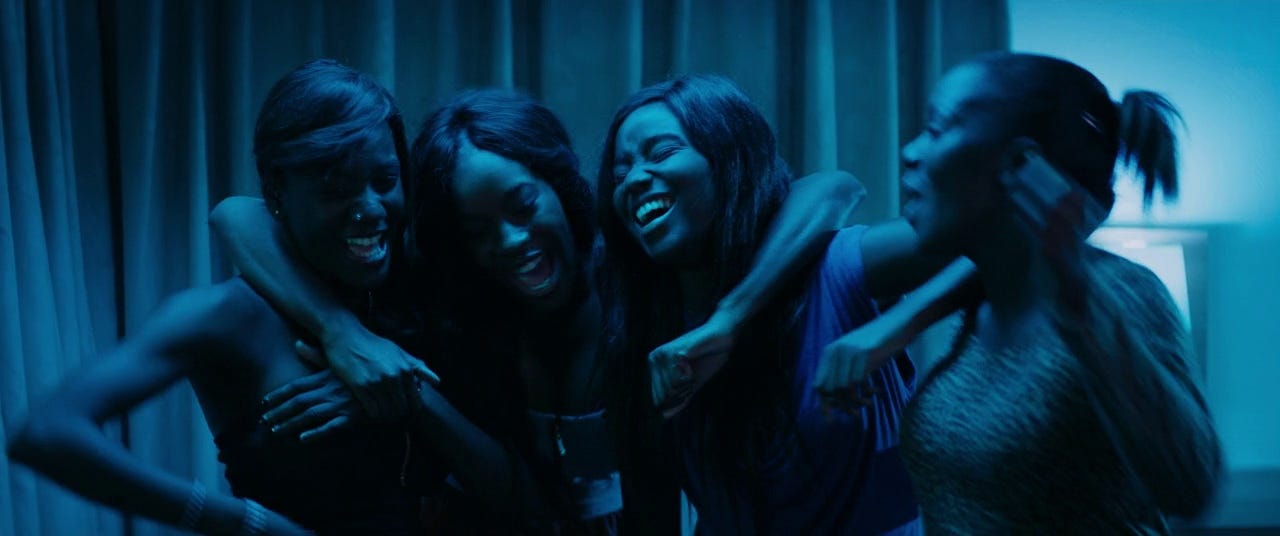Girlhood
Time waits for no woman

I was lucky enough to see an advance screening of Everything Everywhere All at Once late last week, and I can’t think of a better movie to prompt a trip to the theatre. Especially if you haven’t been in a while. We laughed. We cried. The originality on display in this movie makes one easily imagine it being the inspiration for someone young getting into film-making. Do yourself a favor and go watch Everything Everywhere All at Once.
As for Movie Night, however, you’re in for a special film…
Best known in the US for the outstanding Portrait of a Lady on Fire (2019), master of Queer Cinema, screenwriter, and director Céline Sciamma has been making films since 2007. Band de filles (Girlhood, Céline Sciamma, 2014) is Sciamma’s third feature length film.
Girlhood opens with rock and roll music, American football, and slow motion; all hallmarks of a film one might typically expect to be fueled by testosterone. The twist here; our footballers are a group of talented young Black girls. After the game, the girls walk home in the dark, with silhouetted men watching from the shadows of buildings in the projects of Paris suburbs. The following day we meet Marieme (Karidja Touré), who is having a conversation with a school counselor and learning that she has nowhere to go; she can’t repeat a grade and she doesn’t qualify for any technical programs. We get the sense that there’s more to her struggle than an inability to perform at school. As she’s leaving, she meets a new group of girls hanging outside that she would normally avoid, but given her situation she decides to take them up on their offer to take a train into Paris.
They hit the mall. They kill time. They walk around and comment on how others are dressed, comparing themselves. They go shopping. They get racially profiled. They chill on their phones. They pull a knife on a rival group of girls in the train station. They dance on the subway. All the while, Marieme is our proxy for the new world opening up; a world of kids trying to find their way. When Marieme arrives home, which we learn is not a safe environment, something changes. As she’s doing the dishes she pockets a knife. She tells her family she’s going to school the next day, though this is not true. Despite this, we understand that she is about to embark on an education of sorts.
“I do what I want” becomes a mantra instilled in Marieme by Lady (Assa Sylla), the de facto leader of the group. And so begins Marieme’s journey of self-discovery, freed from the systems that attempt to iron kids out, and failing that, discards them. The girls experiment with new clothes, they sing Rihanna in a hotel room, bathed in the blue light of the late hours. They extract happiness with abandon from a world that freely offers none.
The film pushes us to live completely in the moment, like our characters. Consider a scene where Marieme and a boy she is interested in share a kiss; the outer frame goes dark, an unnatural seeming injection of negative space, erasing everything outside of the two characters. Did the lights actually go out at this exact moment? It doesn’t matter, we understand the truth of what we’re seeing. Beautifully shot in a variety of blues and yellows, Girlhood walks a fine line between strict composition, without ever feeling unnatural.
There is a scene midway through the film where the girls are playing a silly game; mini golf. Two of them begin to argue about the best putt to succeed at the hole. Fily (Mariétou Touré) wants to shoot around the clearest path forward, using the edges to get to the hole. Adiatou (Lindsay Karamoh) insists that she follows the clear path laid out for her. Their argument escalates beyond reason, until Fily finally takes the shot around the tunnel that she wanted to take, and makes a hole-in-one. Adiatou bursts into tears, practically inconsolable. Life is full of structure created to push us in specific directions, and we’d like to believe that this structure exists for our benefit; to help us succeed if we trust. It can be a shattering revelation in childhood to learn otherwise.
Sadly, no matter how much we live for today, tomorrow will always find us. As the film progresses, a future begins to take shape for Marieme, but is it the future she wants? What choice does she have? By the time the color red hits the frame, it feels like violence. The film is expertly edited with a minimal score demarcating the stages of Marieme’s journey and education. Girlhood expertly and painfully illustrates the hydraulic press that is our environment and its effect on individuality. Misogyny exerts itself at every turn, further complicating a coming-of-age that we would like to imagine shouldn’t be an uphill struggle. How can we be ourselves when it's not safe to do so?
In the final frames, the camera, and our point-of-view, moves forward, past our protagonist. Is she being left behind? Time won’t stop for any of us. If we’re strong, and learn to navigate a world that offers no easy answers, maybe we can keep up.
Girlhood
Written and Directed by Celine Sciamma
2014
112 minutes
French
